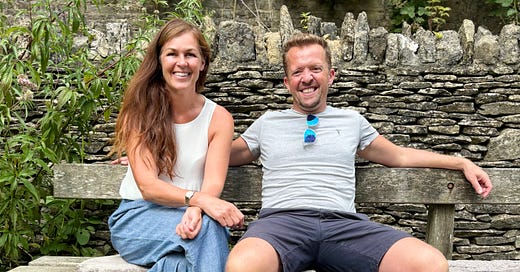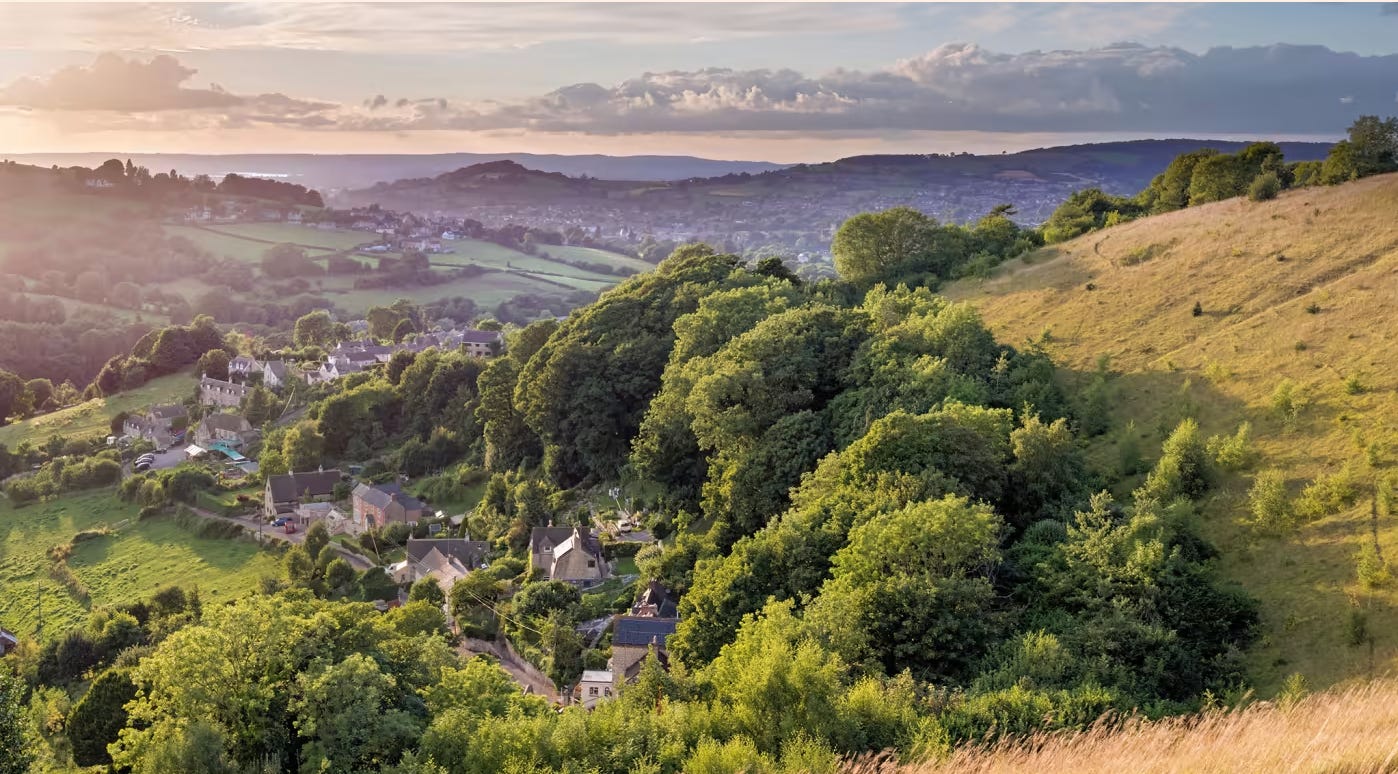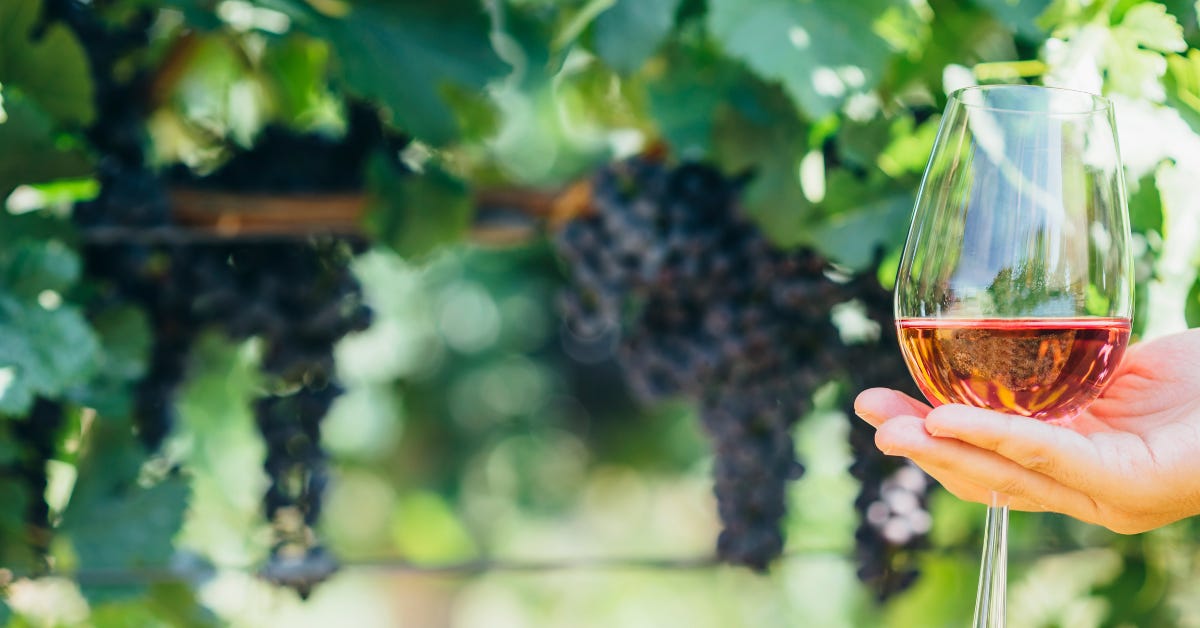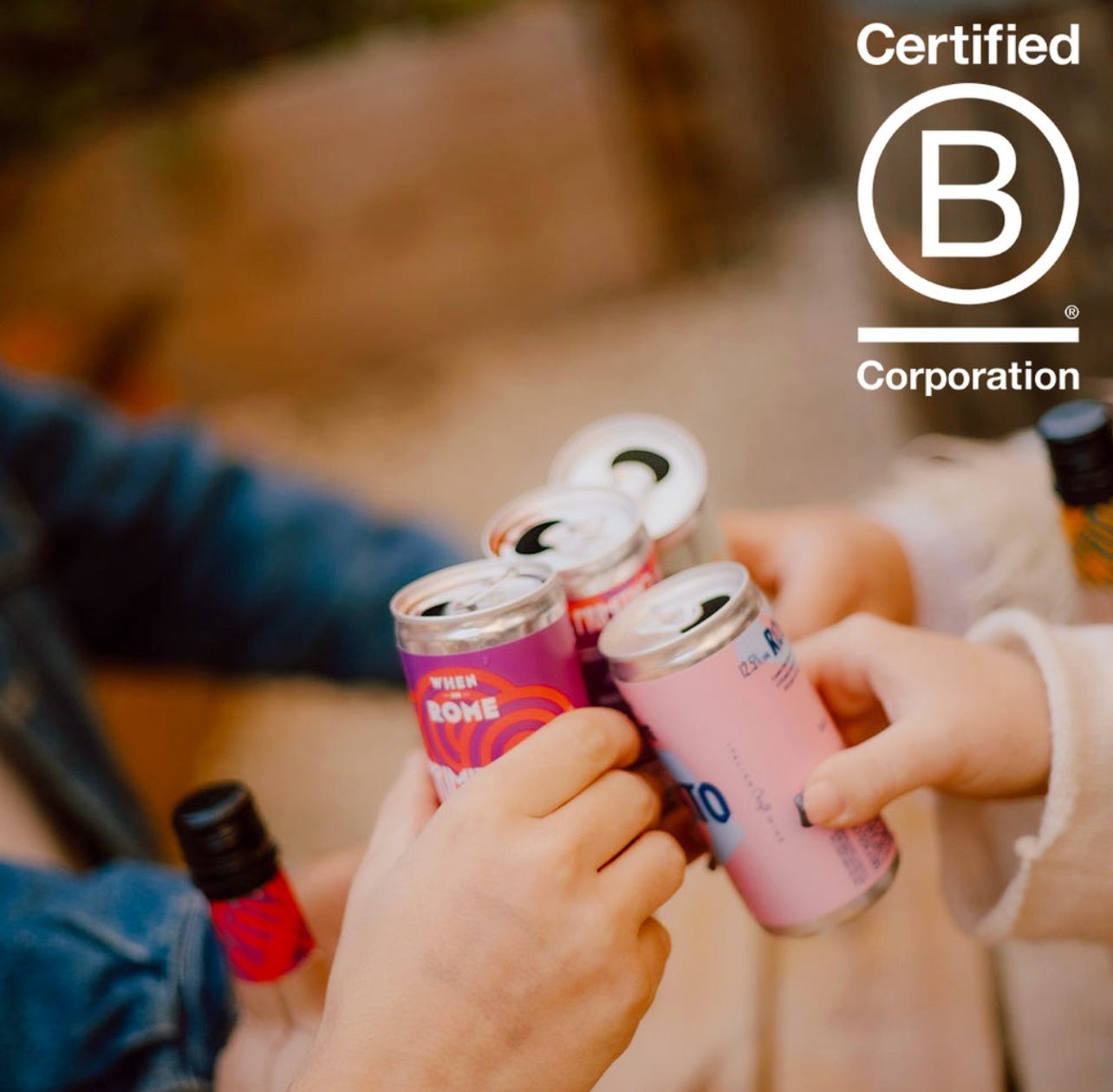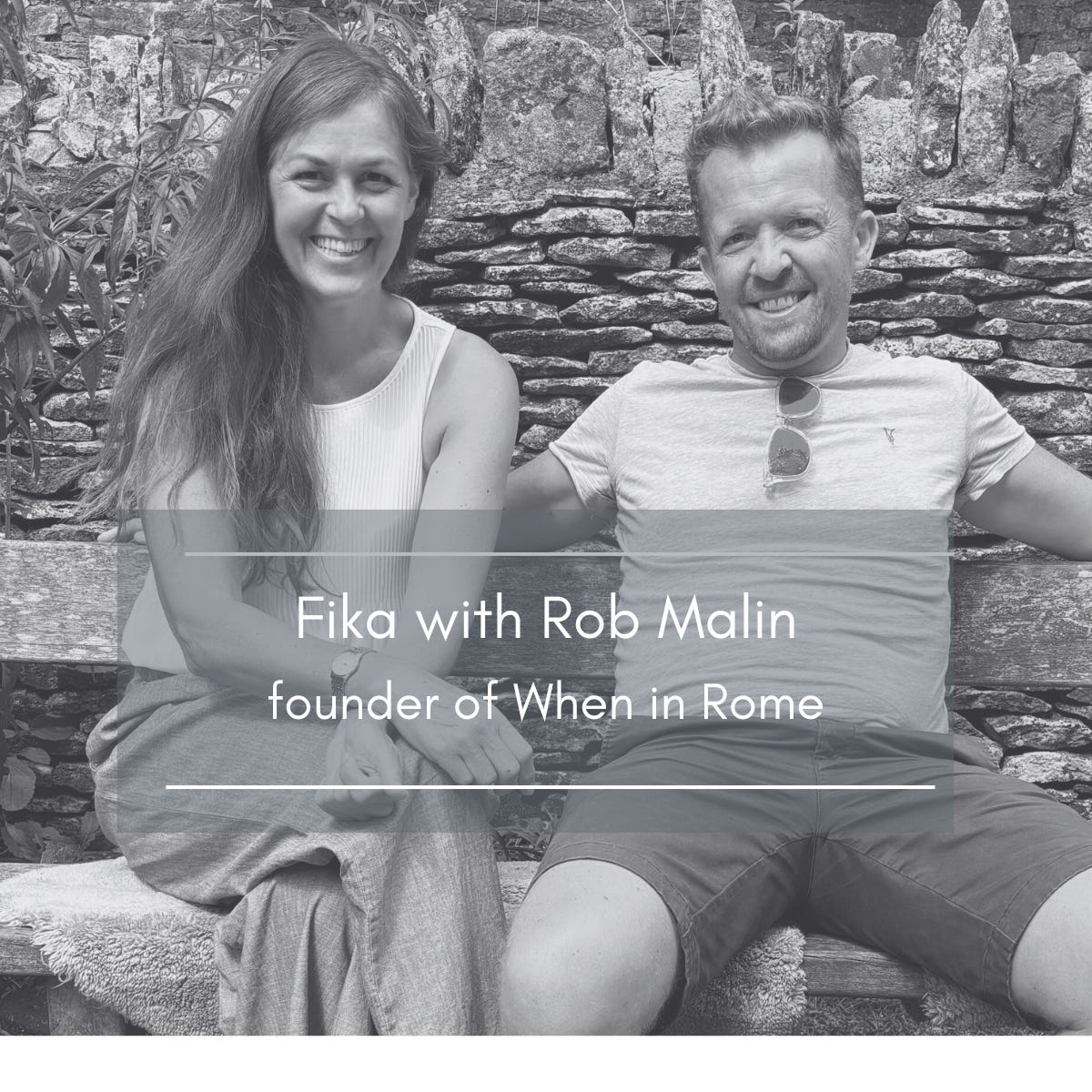Fika with Rob, founder of When in Rome wine
Where I learn about Rob’s mission to help decarbonise the wine industry one glass bottle at a time.
Encouraged to speak to strangers in their mother tongue, Rob credits his father with the confidence to turn his side hustle into a business. That, and his desire for less politics in the workplace and more purpose and personal fulfilment in his professional life.
Rob and I were connected by a mutual friend who knew that we would bond over our common interest in sustainability and conscious consumption. We met close to Stroud - well known for its creative community and as an emerging epicentre for purposeful business. When in Rome certainly seems to have set down roots in the right place.
Wolstenholme Images
Amongst good company
Home to Ecotricity, the birthplace of the organic food movement and home to Britain’s first fully organic café, Stroud is also home to the Biodynamic Agriculture Association. We’ll come back to Rob’s interest in sustainable agriculture a little later.
Dubbed the ‘Covent Garden of the Cotswolds’ when Jasper Conran and Isabella Blow opened the inaugural Stroud farmers’ market in 1999. The meeting point of the Five Valleys is a place where creativity and environmental sustainability collide, and good things happen.
Loose Wine
Rob founded When in Rome in 2015. During his time in commercial banking, he had lived in Italy. Living like a local led him to vino Sfuso – quite literally ‘loose wine. It’s the way the Italians buy everyday wine, especially those living in rural communities close to growers. ‘You rock up with your empty water bottle, they fill it up from the cask and you hand over your cash. At a euro a litre, it’s great for the pocket and the local economy.’
image via Unsplash
His curious nature found him researching market share of bag-in-box wine and realising the opportunity. In Scandinavia and other north European countries its customary to buy table wine in a box. In Sweden 65% wine is sold that way. Swedes head off to their summer houses a box of bagged wine under each arm, knowing that 50% of the wine industry’s carbon footprint is from single use glass bottles. They are conscious consumers, the Swedes.
Alternative format wine
Shortly after registering the business, Rob was joined by his Italian co-founders. He put in the start-up capital, they invested their knowledge and expertise. When in Rome is the UK’s leading alternate format wine company. An off-trade business supplying wine to retailers in 3 low-carbon formats:
Bag in box
Paper bottle
Aluminium cans
I hadn’t clocked the paper bottle before we met. I’d been a bit fixated on the wine in a can, having recently piqued my interest on social media. But now the story gets really interesting. Wine in the world’s first paper wine bottle? Tell me more.
image by kind permission When in Rome Wine
Uncorked, the carbon calories of bottled wine
If we swirl & sniff the environmental impact of bottled wine, you might be more discerning in choosing which to sip.
When investing in wine to lay down, bottled wine is the obvious choice. In fact, you would not find vintage wine sold any other way. Glass has a low oxygen transmission rate and when laid on its side to prevent the cork drying out, it’s the very best way of ensuring the longevity of investment wine.
Wine for everyday consumption however does not need to be stored in a glass bottle to preserve its integrity or flavour. Wine for midweek dinner or shared over lunch with friends only needs short shelf life.
According to UCLA Institute of the Environment and Sustainability glass bottle packaging releases 0.69 kg CO2/litre of wine compared to 0.172 kg CO2/litre of bag in box wine. The carbon footprint of bottled wine is largely attributed to the manufacture process. The melting point of glass averages 1500C and furnaces are maintained and in operation 24/7 365 days a year. Added to that is the carbon cost of the distribution and the environmental cost of recycling.
‘We want to help the rest of the world enjoy wine like the Italians do – in a more sociable, healthy and environmentally sustainable way.’
That’s before considering consumer expectation and product specification. If you buy a bottle of rose, it’s sold in a clear glass bottle. That can only be made from virgin glass. If you buy a bottle of branded red wine, all bottles required to be the same shade of green in line with brand guidelines, that also demands virgin glass. And most wine bottles are not recycled into new wine bottles rather road surfaces or golf-course sand bunkers.
‘Everyday wine doesn’t need to be stored or sold in glass bottles, so we are decarbonising the wine industry with alternative packaging solutions’
There are some great producers exploring light weight glass wine bottles, but we keep returning to the fact that most wine that goes from shelf to table in days or even hours, doesn’t need to be in glass.
images by kind permission When in Rome
From the station market to the shelves of Waitrose
Rob fondly recalls the early days at Bath Farmers Market, his stand just across the way from Wolf Wine. Angus became Rob’s first stockist, which put an end to his days as a direct-to-consumer market trader. ‘It was great having first hand feedback – I do miss the interaction and customer insights from those days, but not the cold’.
He also took a pitch at the Wine Car Boot at Coal Drops Yard. A serendipitous encounter with the wine buyer for Waitrose led to an inbound email 5 months later. It didn’t take long for the board to give their unanimous approval to be stocked on the shelves of the UKs leading sustainable supermarket.
Then came the ripple effect with inbounds from British Airways, Sainsbury, Ocado and most recently Asda. When in Rome are democratising everyday wine.
Juggling challenges & opportunities
Springboarding from the 2023 Coldplay tour, where When in Rome helped the band save more than 8 tonnes of CO2 in just 2 concerts (the equivalent of removing 5 petrol cars from the road) they have a fair wind behind them. A robust sales strategy now in place and most recently a new CFO joining the board, the main challenge for Rob and the team right now is managing the distribution network. Last year When in Rome was stocked in 350 supermarkets, this year 1400. Supporting retailers in meeting their ESG objectives, the flywheel is spinning. It’s a great problem to have! And one which he hopes will appeal to future investors.
‘Our sustainability credentials have opened unimaginable doors of opportunity.’
Rob and the team work closely with carbon auditor Carbon Cloud, carbon auditors recommended to them by business neighbours Ecotricity, and were accredited as a B-Corp in October 2023. Proud not only to be a B-Corp, but also to be the only UK wine brand in UK that publishes its carbon footprint on their consumer packaging. When in Rome are not only fluent in Italian, but in carbon calories! So, when you know that a paper bottle of When in Rome wine costs around 1kg CO2 compared to 1.5KG for the average glass bottle of wine, buying everyday craft wine in alternative formats, seems like a no-brainer!
image by kind permission When in Rome Wine
Where did Rob’s journey to entrepreneurship really start?
So, after hearing about his inspiration for When in Rome, and having understood the problem that the business is trying to solve, we navigate our way to Rob’s personal journey to discover where the journey really began and what drives him.
‘Language and wanderlust have always been a big part of my life’ he tells me and cites his father as the person that had the biggest influence. He insisted that Rob ordered food in the local language when on holiday. That later gave him confidence to give things ago and start conversations. He also worked hard at school, and he felt a great sense of personal achievement when he found himself the only state school educated recruit in his cohort at Barclays. These early experiences that trigger a dopamine hit are positively reinforcing and imprint on us. And learning not to cause his parents any additional stress while they were managing other family matters, has left him highly independent and self-sufficient. So, when selling Forex and living abroad stopped satisfying not only his inner Italian but any professional fulfilment, he felt equipped to turn his side hustle into a full-time legacy business.
Rob has poured everything into When in Rome, both financially and emotionally. He has experienced personal growth while navigating a great change in his personal life, weathered the storm of Brexit and the impact this pandemic had on the global economy. He is now experiencing great joy as he stands on the precipice of fatherhood again.
‘It’s been a hell of a roller-coaster but if I stop for a moment and look around me to appreciate all that I have achieved and all that might come, I feel blessed. I can take a wild swim at lunch time, sit in a board meeting in my shorts and be home to have supper with my children.’
Rob is so much happier being his own boss rather than an employee. There is no politics, he doesn’t work the ridiculous hours required in banking and he carves out time for running and crossfit.
The traits and characteristics of a successful founder?
Rob quickly and succinctly lists the following he believes to be the traits that predetermine entrepreneurship:
Resilience
Vital energy
Optimism
Confidence
Self-belief
Rob caveats that with ‘measured’ self-belief. And adds that he has the ability to recognise where his skills lie and where there are gaps. That’s when you need to hand over and delegate to those who have more knowledge and experience. Know your weaknesses and act accordingly.
Rather than be inspired by other founders, he looks to political and historical leaders for inspiration. Political decision-making aside, Tony Blair, Emmanuel Macron and Barack Obama can teach us a thing or two about resilience, conduct and being true to values.
For now, he surmises, ‘I’m the right choice as CEO, but I also fully recognise that I might not be the best person to drive the business forward in the future. That’s a conversation I would be very open to having when the time comes, as I want this business to succeed so that I can realise the return on my financially and emotional investment.’
And the next 12 months, what do they have in store?
When in Rome has no back stop. ‘We will be open to investment in the next 12 months and while we are currently short of where we need to be in terms of margins, growth & revenue, we are working on that.’ The primary purpose has and will not change. When in Rome is here to continue to decarbonise the wine industry and Rob believes that serious change is coming as there will be no real change without legislation. There will be a carbon tax. Listed companies will have to achieve net zero and if not on their own merits, Rob believes they will be required to buy tax reduction credits. The opportunity will be huge for When in Rome. ‘The new Government has real vision on net zero and I’m feeling really good about it.’
What about English wine, and owning a vineyard?
With a lot of buzz around English wine Rob recognises that climate change favours the growth of English wine but explains that viticulture is not as straightforward as you think. Might become too hot to grow grapes in Southern Italy, but there is centuries of knowledge and experience that we simply don’t have here in the UK. And no, he would never buy a vineyard because of the stress involved.
‘I’ve seen first-hand on the slopes of Tuscany how it ages you. An entire year’s crop can be spoiled in a single evening at the mercy of an unexpected weather. storm.’
When his work is done at When in Rome, we return to sustainable agriculture. While Rob is keen to pursue other interests in decarbonisation and viticulture, he recognises the current challenge of leading a consumer brand required to keep its rate of sales high, whilst simultaneously championing positive change in supply. The business needs to demonstrate sustainable growth before he gets to dip his toes in the sustainable grape-crushing vat.
image credits: Felt & author
We enjoyed afternoon Fika at Felt in Brimscombe, an independent family run café nestled between the River Frome and the Thames & Severn Canal at Bourne Mills. Now home to a clutch of small business the shadow of former light industry and innovation still palpable.

